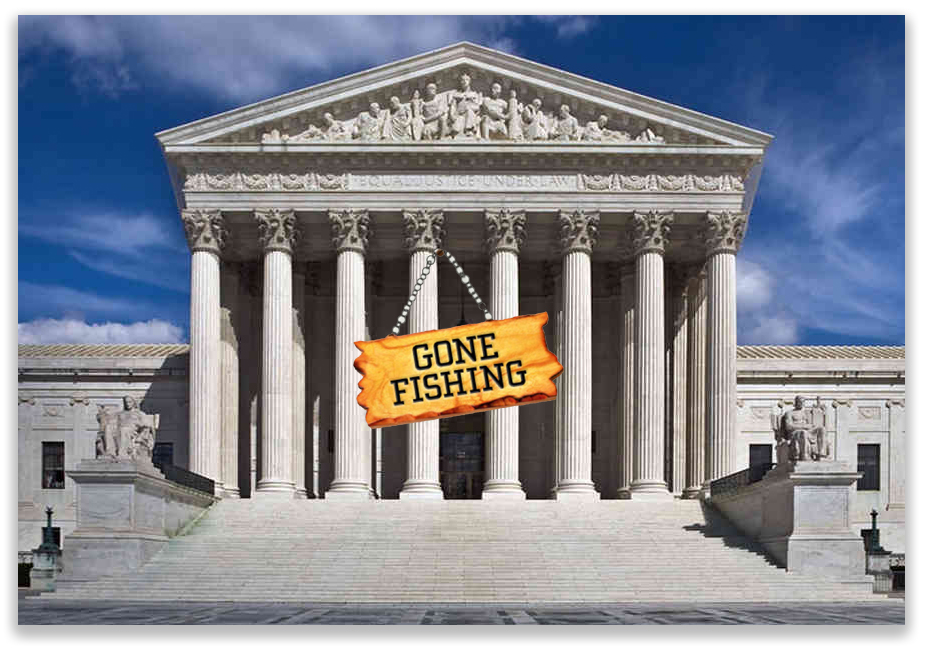We post news and comment on federal criminal justice issues, focused primarily on trial and post-conviction matters, legislative initiatives, and sentencing issues.

SUPREME COURT BEATS FEET FOR SUMMER, LEAVES DIMAYA STRANDED
The Supreme Court ended its October 2016 term yesterday by issuing several higher-profile decisions, including one on not denying state programs to churches, and granting certiorari on the Trump Administration’s travel ban.
 But we are nothing if not one-issue commentators here, so we left the final session of the term unsatisfied, as the Court left two immigration cases – including the long-awaited Sessions v. Dimaya – undecided.
But we are nothing if not one-issue commentators here, so we left the final session of the term unsatisfied, as the Court left two immigration cases – including the long-awaited Sessions v. Dimaya – undecided.
The Court is adjourned until October 2, 2017, when its next 9-month session begins.
The issue in Sessions v. Dimaya, Case No. 15-1498, is this:
When a noncitizen is convicted of a crime, he can be deported if his crime was an “aggravated felony.” Under the Immigration and Nationality Act, an “aggravated felony” is defined to include a “crime of violence,” which is in turn defined in 18 U.S.C. § 16 as any felony that, “by its nature, involves a substantial risk that physical force against the person or property of another may be used in the course of committing the offense.”
In 2015, the court ruled in Johnson v. United States that the “residual clause” in the Armed Career Criminal Act had a definition of “violent felony” – which was similar, although not identical, to the definition of a “crime of violence” – that was so ambiguous that it violates the Constitution’s bar on vague criminal laws. The question is whether the same is true for the INA’s definition of a “crime of violence,” and by extension, the 18 U.S.C. § 16 definition of a crime of violence.
 Yesterday, the Supreme Court punted, setting the case for reargument next fall. This suggests that the Court was splintered as to how to decide it, probably split 4-4 (the case was argued before Justice Gorsuch joined the court). That means Justice Gorsuch will be the swing vote.
Yesterday, the Supreme Court punted, setting the case for reargument next fall. This suggests that the Court was splintered as to how to decide it, probably split 4-4 (the case was argued before Justice Gorsuch joined the court). That means Justice Gorsuch will be the swing vote.

No Justice announced retirement yesterday, although rumors flew that Justice Anthony Kennedy, who just turned 80, might do so. Justice Kennedy’s wife, Mary, was not present in the courtroom (as she often is), leading SCOTUS observers to discount the likelihood of a Kennedy retirement this year.
The failure of any Justice to make a retirement announcement is not terribly significant. Justices announce retirement at any time, not specifically on the last day of the term. If one would retire before October, a reargument could still leave the court deadlocked.

The Court also issued two orders of interest:
 Sessions v. Binderup, Case No. 16-847: The question was whether 18 U.S.C. § 922(g)(1), which prohibits felons from possessing firearms and ammunition, is unconstitutional under the Second Amendment based on the petitioners’ claim that their criminal offenses and other particular circumstances do not warrant a firearms disqualification.
Sessions v. Binderup, Case No. 16-847: The question was whether 18 U.S.C. § 922(g)(1), which prohibits felons from possessing firearms and ammunition, is unconstitutional under the Second Amendment based on the petitioners’ claim that their criminal offenses and other particular circumstances do not warrant a firearms disqualification.
The Court relisted the petition six times – an unusual number of times to reconsider a petition for writ of certiorari – but yesterday it denied the petition for certiorari.
The multiple relistings suggest that the court may be close to accepting a case on this topic.
Hicks v. United States, Case No. 16-7806: When Marcus Hicks was sentenced, he was eligible for the lower sentence for crack cocaine offenses under the Fair Sentencing Act, because while he committed the crime before the FSA passed, he was being sentenced after it passed. But no one noticed, and before the 5th Circuit, nobody argued it. Marcus got the higher sentence. He asked the Supreme Court for certiorari to correct it.
 Yesterday, the Supreme Court GVR’d the case (which is SCOTUS shorthand for granted certiorari, vacated and remanded all at once) summarily reversing the 5th Circuit, and sending the case back. Everyone agreed Marcus met the first two elements of plain error: The court could see a mistake had been made, error was obvious. But two other elements had to be met also: Marcus’s substantial rights to a lower sentence had to have been harmed, and the error had to implicate the fairness, integrity, or public reputation of judicial proceedings.
Yesterday, the Supreme Court GVR’d the case (which is SCOTUS shorthand for granted certiorari, vacated and remanded all at once) summarily reversing the 5th Circuit, and sending the case back. Everyone agreed Marcus met the first two elements of plain error: The court could see a mistake had been made, error was obvious. But two other elements had to be met also: Marcus’s substantial rights to a lower sentence had to have been harmed, and the error had to implicate the fairness, integrity, or public reputation of judicial proceedings.
The Supreme Court sent the decision back to the 5th Circuit to determine the last two factors.
Justice Neil Gorsuch, only two months on the Court, filed a concurring opinion on Marcus’s remand which hints that he may approach federal criminal law matters with an open mind and a sense of fairness. The Justice wrote:
Everyone agrees that Mr. Hicks was wrongly sentenced to a 20-year mandatory minimum sentence under a now-defunct statute. True, Mr. Hicks didn’t argue the point in the court of appeals. But before us the government admits his sentence is plainly wrong as a matter of law, and it’s simple enough to see the government is right…
A plain legal error infects this judgment—a man was wrongly sentenced to 20 years in prison under a defunct statute. No doubt, too, there’s a reasonable probability that cleansing this error will yield a different outcome. Of course, Mr. Hicks’s conviction won’t be undone, but the sentencing component of the district court’s judgment is likely to change, and change substantially. For experience surely teaches that a defendant entitled to a sentence consistent with 18 U. S. C. §3553(a)’s parsimony provision, rather than pursuant to the rigors of a statutory mandatory minimum, will often receive a much lower sentence.
When it comes to the fourth prong of plain error review, it’s clear Mr. Hicks also enjoys a reasonable probability of success. For who wouldn’t hold a rightly diminished view of our courts if we allowed individuals to linger longer in prison than the law requires only because we were unwilling to correct our own obvious mistakes?”
– Thomas L. Root


 In his concurring opinion, Justice Gorsuch wrote:
In his concurring opinion, Justice Gorsuch wrote:





